The best recipes for pickling cucumbers in a plastic bucket for the winter and recommendations for storing such preparations
Pickled cucumbers have a unique taste that cannot be confused with anything else. For this reason, many housewives are beginning to think about preparing similar pickles in their apartments. The problem of the lack of a barrel and a place to store it is solved by the method of pickling cucumbers for the winter in plastic buckets.
Features of pickling cucumbers for the winter in plastic buckets
Before you start pickling cucumbers in a plastic bucket, familiarize yourself with the features of this process:
- Use only fresh fruits of the same size without damage or signs of disease.
- Carefully inspect the bucket for chips and cracks.
- To activate the fermentation process, place the containers with pickles in a dark room with a temperature of 8-12 °C.
- Keep the cucumber preparation in brine for at least 3 days.
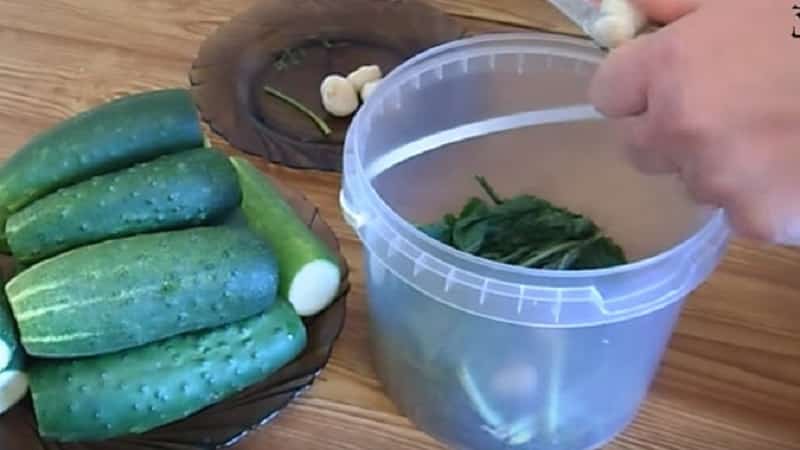
Pay special attention to the choice of cucumbers. Discard specimens that are too large or overripe. Juicy fruits without voids and large seeds are suitable for pickling, and their peel should not be covered with thorns and large pimples.
Reference. The ideal choice is cucumbers 10-13 cm long. They contain the optimal amount of sugar and lactic acid to activate the fermentation process.
Which buckets are suitable
When choosing a bucket, pay attention to its integrity. Inspect the bottom and walls of the container in advance to notice cracks in time. If you plan to store the products in your apartment, purchase special buckets with lids.From hermetically sealed containers, the bright aroma of pickles will not be able to spread throughout the house.
Attention! Enameled buckets are also suitable for pickling barrel cucumbers at home.
Advantages and disadvantages of pickling cucumbers in a bucket
Pickling cucumbers in a bucket is no different from fermenting them in wooden barrels. In addition, this the procedure has a number of advantages:
- saving money (buckets are cheaper than barrels);
- plastic containers do not take up much space;
- prepared vegetables are not inferior in taste to barrel vegetables;
- ease of preparation;
- a large number of different recipes and salting methods.
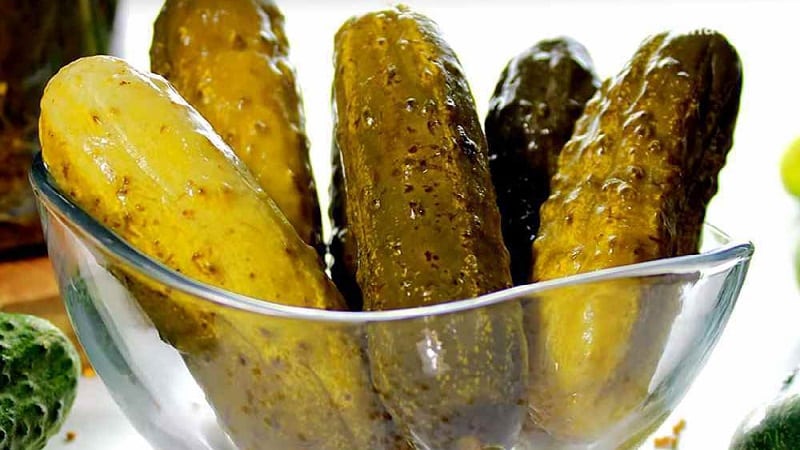
But besides the advantages, salting in buckets also has some disadvantages. These include:
- After fermentation, mold may form on the surface of the brine. In this case, simply remove it, and distribute the cucumbers into sterilized jars and roll up.
- Some chefs believe that plastic releases harmful substances that can poison the snack. Choose containers made from food-grade material and you won’t encounter this problem.
Attention! Pickled cucumbers are healthier than pickled cucumbers, since vinegar is not used for their preparation. This method of canning involves the use of natural fermentation caused by a natural substance found in cucumbers - lactic acid.
Best Recipes
Among the variety of recipes for pickling cucumbers in plastic buckets, every gourmet will be able to find an option to suit their taste.
Cucumbers “Like barrels”
Fans of old recipes will certainly want to prepare a classic version of pickles in an oak barrel. In modern realities, not everyone has such a container, but you shouldn’t be upset, because this recipe will always help you out.
Compound:
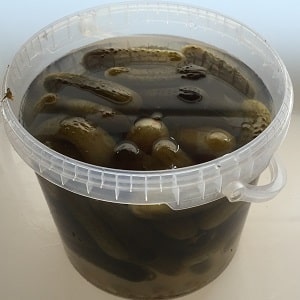 cucumbers - 1 bucket;
cucumbers - 1 bucket;- water - about 5 l;
- rock salt - 1 tbsp. spoon for 1 liter of water;
- leaves of grapes, currants and horseradish - 2-3 pieces each;
- garlic - 10 cloves;
- peppercorns - 10 pieces;
- dill umbrellas - 6 pieces;
- oak blocks - 4-6 pieces.
Attention! The sticks can be replaced with a small amount of oak bark.
Cooking method:
- Rinse the cucumbers well and remove the stems, then cover with cold water for 5-8 hours.
- Dissolve salt in water, keep in mind that the required volume of brine depends on the number of vegetables and the size of the bucket.
- Place a container with brine on the stove, add allspice and garlic cloves, bring to a boil and cook for 5 minutes.
- Place half of the dill umbrellas and fragrant leaves at the bottom of the bucket.
- Fill the container with cucumbers and place them horizontally at the bottom.
- Cover the vegetables with the remaining herbs and place oak blocks on it.
- Fill the bucket to the brim with slightly cooled brine.
Keep the preparations in a cool place, for example, in the basement. The first sample can be taken after 3 weeks.
Other ways to prepare cucumbers for the winter:
Crispy cucumbers without sterilization: pickling methods
Recipes for delicious sliced cucumbers pickled in jars
Delicious crispy pickled cucumbers in jars without sterilization
Recipe with garlic
The cucumbers will turn out very fragrant and crispy if you pickle them according to the following recipe. For this need to prepare:
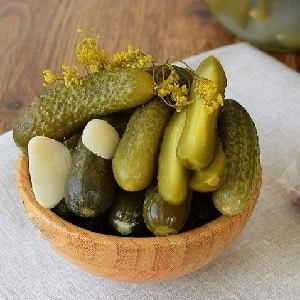 cucumbers - 8 kg;
cucumbers - 8 kg;- spring water - 5 l;
- salt - 300 g;
- garlic - 4 heads;
- dill umbrellas - 8 pieces;
- horseradish root - 50 g;
- oak, black currant and cherry leaves - 10-15 pieces each;
- horseradish leaves - 3 pieces.
Salting algorithm:
- Cover the cucumbers with cold water.
- While the fruits are soaking, wash and dry the bucket, peel the garlic.
- After 6 hours, remove the fruits from the water and rinse well.
- Fill the bucket with cucumbers, place dill umbrellas, pieces of horseradish root and garlic cloves between the layers.
- The very last (top) layer of fruit should be 7-10 cm below the level of a full bucket.
- Cover it with leaves and fill it with a brine of clean water and salt.
- Cover the cucumbers drenched in brine with a wide plate or wooden circle, and then press down with some weight, for example, a large stone.
- After 5-7 days, package the snack in jars, fill with the same brine and roll up.
Attention! To extend their shelf life, cucumbers are distributed into sterilized jars and filled with boiled brine. But at the same time, the product loses its original taste and ceases to be crispy.
Hot pickled cucumbers with hot peppers
Fans of spicy dishes will appreciate the following recipe pickling cucumbers in buckets:
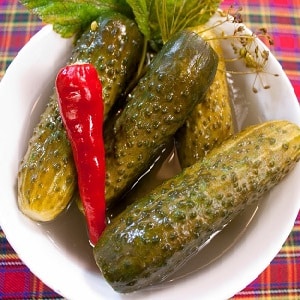 Divide the bunches of parsley and dill umbrellas into 2 parts. Place the bottom of the container first, place a small pod of hot pepper and a few cloves of garlic there.
Divide the bunches of parsley and dill umbrellas into 2 parts. Place the bottom of the container first, place a small pod of hot pepper and a few cloves of garlic there.- Fill the bucket with cucumbers and place them vertically.
- Alternate each row of vegetables with garlic, currant and horseradish leaves, and hot pepper pods.
- Cover the last layer of cucumbers with the remaining herbs.
- Dissolve 400 g of salt in 5 liters of drinking water, boil, cool until warm and pour the resulting liquid over the vegetables.
- Place a plate or bucket lid on top and place a weight on it.
- In a week you can taste the cucumbers to see if they are ready.
Attention! The amount of hot pepper depends on the desired level of spiciness. You can cut one pod into slices and place them between layers of cucumbers.
Cold salting
Cold salting - the easiest way to prepare vegetables for the winter, even novice cooks can handle it.
The amount of ingredients is calculated for a 5 liter bucket:
- cucumbers - how much will fit into the container (about 2.5-3 kg);
- cherry leaves - 10 pieces;
- black and allspice pepper - 15 peas;
- garlic - 8 cloves;
- salt - 5 tbsp. heaped spoon;
- horseradish leaves - 6 pieces.
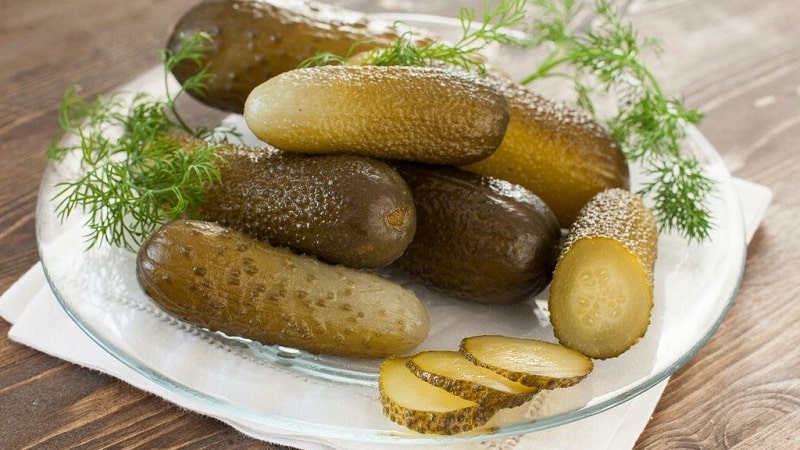
The recipe does not require boiling the brine, pickle cucumbers according to the following scheme:
- The bucket is carefully filled with cucumbers, alternating them with leaves and other spices.
- Add salt to a glass of water and stir until completely dissolved, then pour it over the vegetables.
- Add drinking water to the container (to the brim).
- Cover with a plate and leave to ferment for 4-5 days.
- Cover with a lid and store in a cool place.
Read also:
Delicious, crispy, pickled cucumbers with vodka for the winter in jars
Recipes for cold pickling cucumbers for storage in the apartment
Pickled cucumbers with bell pepper
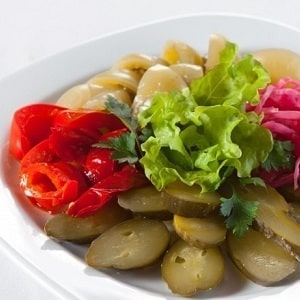 It’s not a shame to put an assortment of vegetables from cucumbers and sweet bell peppers on the holiday table. It is prepared as follows:
It’s not a shame to put an assortment of vegetables from cucumbers and sweet bell peppers on the holiday table. It is prepared as follows:
- Wash and dry 5 kg of vegetables well, chop the peppers coarsely.
- Dissolve 400 g of salt in 8 liters of water, add 6 bay leaves, a bunch of parsley, 10 allspice peas and bring to a boil.
- Place the cucumbers and peppers in a bucket and fill with hot, but not boiling, brine.
- Cover with a lid and leave to ferment in a room with an air temperature of 18-20°C for 3-4 days.
How to store blanks
It is best to store pickled cucumbers in buckets in a dark place at a temperature of +1...+5°C. Suitable for this:
- cellar;
- basement;
- glazed balcony (autumn-winter);
- fridge.
To save space prepared vegetables can be distributed into glass jars and filled with the same brine.
Attention! Store the workpieces in a cool place immediately after the brine becomes cloudy.
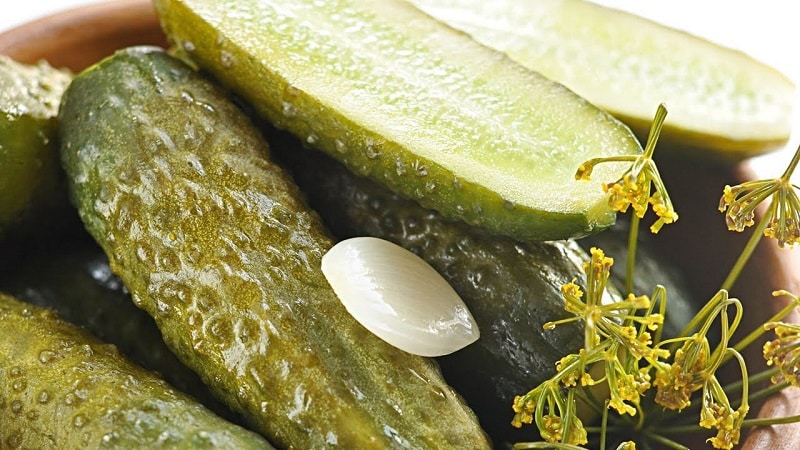
Advice from experienced housewives
Even such a simple task as pickling cucumbers in buckets has its own subtleties. Tricks will help you get a tasty and high-quality snack experienced housewives:
- Use vegetables with thin skin and small pimples; salad varieties are not suitable for pickling.
- Cut off the “butts” of purchased cucumbers - this is where nitrates accumulate.
- When cold pickling, do not place currant leaves in the bucket, as they increase the formation of mold.
- To prepare the brine, use only rock salt; fine and iodized salt will soften the cucumbers.
- Vegetables placed vertically in a bucket are better salted and crispier.
Conclusion
Pickled cucumbers in buckets are prepared without preservatives or vinegar, so they retain all their beneficial properties and remain crispy. The variety of different recipes allows everyone to choose a snack option to their liking.